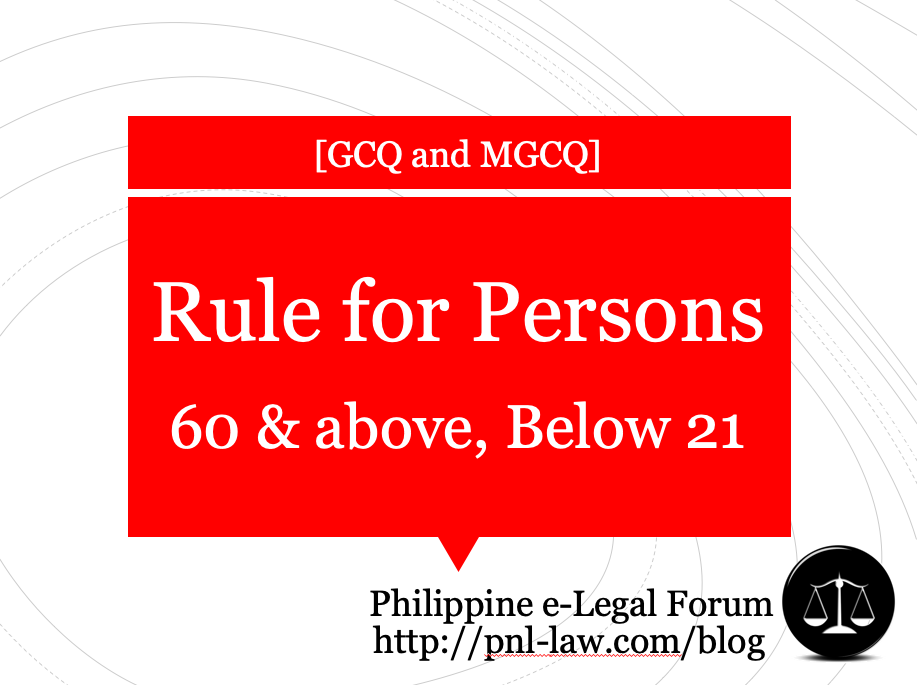The community quarantine classification for all areas in the Philippines has been relaxed, effective 1 June 2020, to either General Community Quarantine (GCQ) or Modified General Community Quarantine (MGCQ). The recent pronouncements by authorities include the rule that persons below 21, those 60 years old and above, and those with immunodeficiency, comorbidities, or other health risks, and pregnant women are prohibited from going outside their respective residences.

FOR GCQ AREAS
As a rule, the movement of all persons in areas placed under GCQ shall be limited to accessing essential goods and services, and for work in the offices or industries permitted to operate [Revised Omnibus Guidelines, Sec. 4(2)]. However, there are exceptions.
Any person below twenty-one (21) years old, those who are sixty (60) years old and above, those with immunodeficiency, comorbidities, or other health risks, and pregnant women, including any person who resides with the aforementioned, shall be required to remain in their residences at all times except when indispensable for obtaining essential goods and services or for work in permitted establishments [Revised Omnibus Guidelines, Sec. 4(3)].
Even in malls and shopping centers, these individuals are allowed to enter when indispensable for obtaining essential goods and services or for work in establishments located therein [Revised Omnibus Guidelines, Sec. 4(7)]. By way of illustration in local governments, Cebu City allows these individuals to go outside when indispensable for obtaining essential goods and services or for work in permitted industries and offices [Executive Order No. 079, Sec. 3(c)].
FOR MGCQ AREAS
IATF Resolution No. 43 dated 3 June 2020 further amended the Omnibus Guidelines, providing that any person below twenty-one (21) years old, those who are sixty (60) years old and above, those with immunodeficiency, comorbidity, or other health risks, and pregnant women shall be required to remain in their residences at all times. Resolution No. 43 also provides that all activities and movements allowed under ECQ, MECQ and GCQ, shall continue to be permitted under MGCQ. [Revised Omnibus Guidelines, Sec. 5(3)].
This means that the rules for GCQ areas, as discussed above, also applies in MGCQ areas.
Work in all public and private offices shall be allowed to resume physical work in full capacity with alternative arrangements for persons who are 60 years old and above, those with immunodeficiency, comorbidities, or other health risks, and pregnant women [Revised Omnibus Guidelines, Sec. 5(6)]. The requirement for alternative work arrangements may appear mandatory at first glance, but looking at the related guidelines issued by other government agencies, these are simply recommendations.
If these individuals are allowed to work in GCQ areas, it is absurd to impose a more strict requirement in MGCQ areas. In fact, under the Joint Interim Guidelines for private workplace COVID-19 prevention and control, “most at risk workers” (those above 60 years old, or of any age with co-morbidities or pre-existing illness, i.e., hypertension, diabetes, cancer, or with immunocompromised health status; or with high risk pregnancy) are allowed to work, with the requirement that employers are highly encouraged to allow these workers to do work from home arrangement. Work Agreements should be developed to detail the deliverables from these employees and there shall be no diminution in wages or benefits.
